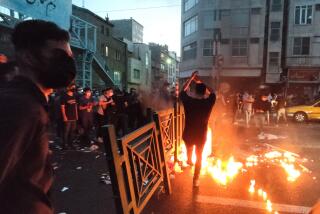Morsi opponents push for a new revolt in Egypt
- Share via
CAIRO — Amir Mahrous waved petitions at passing cars, hoping the “Rebel” stamped in bold letters would inspire motorists to urge the unseating of President Mohamed Morsi through a lawsuit and nationwide protests planned to mark his upcoming one-year anniversary in office.
Mahrous is one of thousands of volunteers across Egypt who sense that another revolution may be at hand and have responded to the calls of a group of revolutionary young people who launched the petition drive in May. The aim is to collect 15 million signatures — more than the number of votes Morsi received in the 2012 election — in an effort to depose the increasingly unpopular Islamist leader.
“The regime did not take one step toward fulfilling the goals of the revolution,” said Mahrous, 21, who was standing in traffic beneath a sweltering Cairo sun. “This is why we are rebelling again.”
The group, known as Rebel, says it has already gathered about 13 million signatures, and it bases its legal argument on language in the constitution stipulating that “sovereignty is for the people.” After gathering more signatures than Morsi’s 13.2-million vote total, they will ask a court to declare his presidency unconstitutional.
The constitution “states that sovereignty is for the people,” said Hassan Shahin, one of the founding members of the group. “So now the people have decided to call for a vote of no confidence in the head of the republic and call for radical change in society.”
About 100,000 Morsi supporters, most of them members of the Muslim Brotherhood and other Islamist factions, marched in a pro-government rally Friday in Cairo. They carried signs that read, “The Koran is the constitution” and “Islam is the solution.”
Supporters of Morsi, who took office June 30, contend that the petitions carry no legal weight against a president who was elected in a free, transparent poll.
“Morsi is not simply going to succumb to these demands and step down, especially when there is no real legal reason for him to do so,” said Adel Hemdan, 43, an accountant. “Things in the country are worse than ever now.... We need to work on fixing things, not hold more protests.”
Rebel intends to deliver the petitions to the Supreme Constitutional Court, Egypt’s highest court, in the week before the June 30 demonstration outside the presidential palace. Authorities worry that the protest will spark renewed violence with the Muslim Brotherhood movement, of which Morsi was a longtime a member.
More than 30 people were injured in clashes this week between Brotherhood supporters and Rebel campaigners in Fayoum, south of Cairo. And on June 7, Rebel’s main office in Cairo was set on fire.
In a recent speech, Morsi condemned violence but said that “some deluded persons believe” they can “undermine [voters] who expressed their will clearly” through a democratic process.
“People were not waiting for us to convince them” to sign, countered Rebel central committee member Mohammad Abdelnasser. “The campaign isn’t succeeding because of us. The people have made it successful by signing, welcoming us, and even collecting signatures themselves.”
Morsi, a political novice, had promised to resolve Egypt’s pressing problems within his first 100 days in office. But the hardships have only multiplied. A security vacuum, fuel shortages, soaring prices, a crumbling economy and recurrent blackouts have exasperated the nation.
The main political opposition, the National Salvation Front coalition, is divided and unable to outmaneuver the Muslim Brotherhood or to rally tens of thousands of young protesters with a galvanizing vision for the country. Rebel said its goal is to fill the vacuum between opposition politicians and the street movement.
“We decided [Rebel] would be an independent grassroots movement that would not exist under the banner of any group or political party,” Shahin said. “This was the main point, to unite behind one democratic idea and demand early presidential elections.”
Whatever Morsi’s fate, “Egypt has no other powers but the military and the Brotherhood. No one else is capable of ruling,” said political analyst Ziad Aql. If Morsi falls, he said, “the only real power will be the military.”
Aql said the Rebel campaign has roused the masses and added a fresh dynamic to the opposition ranks.
“We would be doing the movement a lot of injustice if the benchmark of its success becomes whether or not it is capable of removing Morsi from the presidency,” he said. “I see Rebel as one of the movements that nudged the opposition awake. Now you have a larger banner for the opposition to exist under.”
Abdelnasser said the “popular pressure” that caused President Hosni Mubarak to step down amid the 2011 revolution will also spur Morsi’s downfall.
A group made up mostly of Islamists is planning a counterprotest on June 30, raising the specter of violence despite promises from both sides to keep the peace.
Members of Rebel blame the Muslim Brotherhood for the recent arson and attacks, saying they may foreshadow violence on the day of protests.
“And despite all this, the Egyptian people will go out,” Abdelnasser said. “June 30 stands between us and them.”
Hassieb is a special correspondent.
Times staff writer Jeffrey Fleishman contributed to this report.
More to Read
Sign up for Essential California
The most important California stories and recommendations in your inbox every morning.
You may occasionally receive promotional content from the Los Angeles Times.













